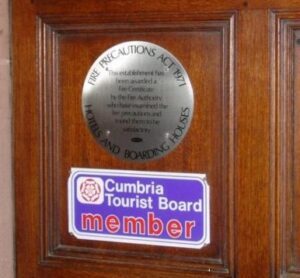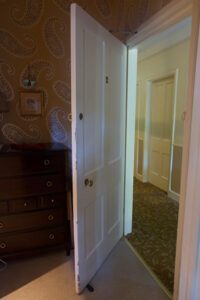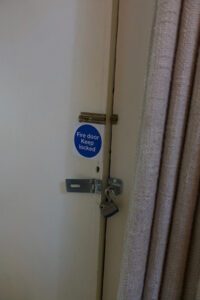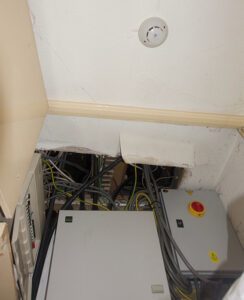After visiting several hotels across England, Alan Cox, whose career spans 50 years in the fire and safety profession, underlines his concerns that standards of fire safety are significantly lacking in this sector, putting the lives of guests and staff at risk. Here, he highlights the many issues he’s found and explains his experiences upon liaising with owners and fire and rescue services.

Alan Cox
When a member of the public books a hotel or other accommodation it is unlikely that the first thing they consider is their personal or their families fire safety. This is because we have come to accept that this is someone else’s responsibility and though previously the onus was primarily on the Fire and Rescue Services (FRS), it now rests with the Responsible Person (RP) together with the FRS, who carry out the enforcement procedures.
How well this works in practice is something that as a member of the public I am concerned about because in my experiences it is not working as it was intended. Ultimately, this leaves the public exposed to unknown and unforeseeable fire safety risks.
Should the public have a greater role in fire safety?

This was a reassuring sign used on hotels under previous fire safety legislation.
This is always a difficult question to answer because it is something that we are not accustomed to, but clearly the shift in responsibility from the FRS to the RP has, in my opinion, not improved fire safety for the general public. There are many reasons for this, but the reduction in FRS personnel carrying out the inspections of these premises, together with a lack of direction and education for the RP, has not helped the situation.
Clearly, if we are to improve fire safety in general, we need to provide better public education, greater direction and information for everyone involved and a more open and honest approach by the enforcing authorities.
Additionally, to give the public a greater role in fire safety, we have to have a system that informs them if the accommodation that they are considering is considered to be safe. This need not necessarily require a massive surge in FRS inspections, but could simply be a declaration of fire safety by the RP, indicating what measures have been taken to protect guests and staff, or whether a Fire Risk Assessment (FRS) has been undertaken and when this was. This could also be converted to a rating system, such as that used for catering establishments, or like the Safe Hotel system used in the USA.
What level of fire safety are we getting at present?
The best way that I can illustrate this is to provide an overview of three recent hotel stays that I have undertaken – one in Cumbria, one in Devon and another in Northumberland.
Devon
This is what I found in Devon in this 17-bedroom boutique hotel:
When I returned home, I requested from the FRS the date of their last inspection and what the results of that inspection were, and I was surprised to find that it had not been inspected since 2012 and whilst it stated that it was “a simple fire safety check” no recommendations were made. As I was concerned about the standard of fire safety at this hotel, I sent both the owner and FRS my Guest Fire Safety Report and copied in HMICFRS. Both HMICFRS and the owner acknowledged receipt but not the FRS – the owner also informed me that the FRS were due to visit shortly, and he would bring my observations to their attention.
As I had not received any further contact from the FRS, I made a Freedom of Information (FOI) request about their actions and the outcome of the inspection and received a copy of their 16-page Letter of Fire Safety Matters that confirmed the points that I had made, together with a few more in areas that I did not have access to. At this point I was somewhat surprised at the outcome of the 2012 inspection, as I feel certain that several aspects are unlikely to have changed in this period, such as the construction of the fire resisting doors, the protection of the external fire escape and protection of the basement area. So was the outcome of the 2012 check good enough and should the public have been exposed to this risk for so long? And does a Letter of Fire Safety Matters really reflect the seriousness of the situation?
From a subsequent Freedom of Information (FOI) request it was established that DSFRS had:
- 9019 hotels and boarding houses identified
- Based on records 2007 to 2021 the average number of inspections was 164
- During 2021 a total of 119 onsite inspections were carried out
- During 2021 a total of 58 desktop inspections were carried out
- The average time between inspections is every three years based on a Risk Based Inspection Programme
- The service has 45.21 Full Time Equivalent Staff in the Fire protection Team
Cumbria
This next hotel was in Cumbria, described as a 20-room 19th century manor house, and this is what I found in this hotel:
- Many fire resisting doors did not appear to meet the 30-minute standard, as many did not have intumescent or smoke strips, had key holes through the doors, did not close properly, and some only had two hinges
- Poor fire exit signage
- Poor housekeeping
- PAT testing out of date
- External escape routes in need of maintenance and protection from fire
As I was also concerned about the level of fire safety following a false alarm, I contacted the owner whilst I was staying there and tried to outline my concerns. Unfortunately, he simply turned his back on me and informed me that I did not know what I was talking about as he had recently had a FRA carried out by a retired senior officer of that FRS and everything was ok.
When I returned home, I sent a Guest Fire Safety Report both to the owner and the FRS and they subsequently inspected and issued a 13-page Enforcement Notice to the hotel covering the items that I had raised, alongside = additional items they had found in areas that I could not access. I also requested by FOI their policy on fitting intumescent and smoke strips on existing fire resisting doors and confirmation that the person that carried out the FRA was a previous member of their service and they replied “Data not held” to both questions. A follow up phone call to this FRS confirmed that the person was indeed a retired member of the service.
So, what does this say about the current process of FRAs in this instance? It appears that this FRA was carried out by a retired officer of the FRS – the website for this company indicated that they were appropriately trained and members of a relevant scheme, yet the hotel received a 13-page Enforcement Notice and so I can certainly understand why the hotel owner was upset.
From a subsequent FOI it was established that CFRS had:
- 7059 registered hotels and boarding houses
- Will audit 570 high risk premises in a 3-year period
- No virtual audits are undertaken
- Eight Fire Inspectors currently employed
Northumberland
The next hotel was in Northumberland and is a listed building with 14 bedrooms, and these were the problems that I identified:
On my return home I sent a Guest Fire Safety Report to the owner and FRS and whilst I had no response from the owner, the FRS arranged an inspection and issued an Enforcement Notice covering Articles 9,13,14,15,17 and 21. During the FRS meeting with the owner it was indicated that the hotel would close and was unlikely to reopen.
During a recent review of the hotels I had previously visited I found that it was open again for business, so I sent a FOI request to NFRS and asked why it was still trading as The Enforcement Register indicated that the Prohibition Notice was still in place. I subsequently received this response:
“The Hotel was not issued with a Prohibition Notice, for some reason the Enforcement Register is displaying “Prohibition” rather than Enforcement. I am not sure if this is an issue with the website or if an error has been made when the information was entered. Our records show that it was issued with an Enforcement notice to carry out work to enable it to operate as a hotel.
“The hotel was indeed closed as a result of the non-availability of the required investment to complete the work. The Fire and Rescue Service conducted regular visits during this time to ensure the premises remained closed. The hotel eventually received investment and began the works to meet the requirements of the Enforcement Notice.”
Another FOI established that NFRS had:
- 406 hotels and boarding houses
- The average yearly inspection rate over 10 years is 44 per year
- No virtual inspections are carried out
- The average frequency for audits/inspections is 46 months
- There are seven full time Fire Safety Inspectors
‘These are not isolated examples’
Unfortunately, these are not isolated examples, and I could provide many more, but I think that these examples, alongside the numerous undercover hotel inspections that I carried out with the BBC, clearly illustrate the following points:
- Poor standards of fire safety in many hotels – around 80% of the hotels had serious problems.
- Long reinspection periods by the FRS
- Questionable levels of fire safety and enforcement
- Difficulty in obtaining information from FRS
- Lack of fire safety information available to the public

This photo shows poor electrical wiring and an opening in the ceiling in a linen store that would allow rapid fire spread into the roof space.
I have also carried out some independent investigations into serious hotel fires, which include the Penhallow and Royal Clarence Hotel fires and again these have raised serious questions about the state of fire safety arrangements and the lack of cooperation from the FRS. In the Penhallow Hotel Fire the FRS even threatened the BBC with legal action if our investigation was shown, but did not follow this up after the programme was broadcast.
Whilst I have not included a detailed breakdown about a hotel in Cheshire because it happened 10 years ago it was nevertheless interesting because three weeks after I sent my Guest Fire Safety Review to the owner and FRS, the hotel experienced a fire that is reported to have cost in the region of £8million. My review outlined my concerns about the poor state of the fire resisting doors, open light/ventilation wells, poor fire compartmentation, poor levels of automatic fire detection and more. The response to my review by the FRS following the fire was as follows:
“Following Mr. Cox’s correspondence Cheshire Fire and Rescue Service undertook a full audit of Peckforton Castle’s fire safety arrangements on6 June 2011. It was judged that the issues were not major life risk concerns and the fire service concluded that with a few changes, Peckforton Castle would more than comply with the Regulatory Reform (Fire Safety Order) 2005, and it was agreed no further inspections were not necessary.”
This was surprising given the amount of work that I had identified, so after a formal complaint and meeting I received a letter that stated:
“I do acknowledge that our description, in the press release, of the fire safety deficiencies being “minor” may have given the impression that we were treating your concerns as unimportant. However, as you know, we carried out the audit on receipt of your complaint and have since then been working with the Hotel to deal with the issues that were found.”
I still find it surprising that the FRS would describe so many fire safety defects as “not a major life risk” and often wonder what defects would constitute a major life risk? From this incident it is difficult to see how we are all trying to achieve the same outcome and to protect the lives of people.
Is my hotel safe in the event of fire?
In my experience, many hotels that I have visited show a serious lack of reasonable fire safety standards for members of the public and staff that have accommodation there. And, with descriptions such as “not a major life risk”, it is difficult to see how we are going to improve the situation.
- Is it fair that guests booking hotels/boarding houses have no way of establishing the level of fire safety in an establishment before making the booking?
- Can it be right that FRS leave periods of over nine years between re-inspections of this type of life risk?
- Should FRS who enforce the legislation also investigate serious life loss fires?
Clearly, many of the above problems are down to the way that fire safety is enforced. I am aware of the dilemma that FRS face when they receive a Guest Fire Safety Report that highlights numerous fire safety defects that they may have missed – especially if they have carried out a reinspection recently and informed the owner/RP that everything is satisfactory.
However, when something like this does occur, they need to be open, honest and transparent about the problems and be willing to work towards a satisfactory conclusion and not hide behind excuses such as “data not held”, “broadly compliant”, “not a major life risk”, “commercial secrets” or data protection. I believe that a collaborative approach that involves all the interested parties is the way forward, but this must start with the FRS who should be willing to work with the industry and be more open, honest and transparent in their actions.
This article was originally published on IFSEC Global.
About the author
Alan Cox has worked for over 50 years in fire and safety profession and started his career in Warwickshire and the West Midlands Fire Services. He then moved to the NHS and on to HSBC where he had a senior global fire and safety position. During his career he has been awarded several awards for his achievements and worked and studied fire safety in the USA and also made the Fire Door Educational Package that was described as “the third major milestone in the history of fire doors”. Since he retired, he has worked with ANEC, the European consumer voice in standardisation, and represents the European consumer interest in the creation of technical standards, especially those developed to support the implementation of European laws and public policies.






Unfortunately, not enough inspections are carried out by the
FRS and owners know they will probably get away with non-compliance with the legislation.
Also, as a deterrent punishment for noncompliance should be far greater otherwise
sadly this problem will be here to stay.
As a travelling Health and Safety Adviser, over the years I have stayed at many, many hotels and hotels of different types. This has included all of the major chains, smaller independents, B&B’s and even AirB&B. From time to time I did find it necessary to bring some fire safety concerns to the attention of a person present (as a Representative of the business). Generally I didn’t pursue the matter any further. I simply saw it as being a moral responsibility on my part to at least let someone know about my concerns. But yes, I have seen some “horrors”… Read more »
Interesting article, appreciated, as I used to be a frequent user of hotels, before 2005, and had a geeky habit of actually reviewing my escape routes and making mental note of which way to turn out of the room for exit. I have had to ask that escape routes / exits be cleared of decorating materials, spare seating etc. and that I was ready to leave if not. Just a couple of pedantic points: Too many abbreviations: though I managed to work most of these out. There is no legal requirement to do any PAT testing, therefore any ‘out-of-date’-ness is… Read more »
I have stayed in many hotels for professional and personal travel and agree that standards of fire safety are quite lax in some, and awful in some others. Wedged fire doors is common and I have often removed and disposed of them, as well as raising it with management and in some cases with regulatory authorities.
Removed the wedges, not the doors:)
I have noted similar problems in hotels I have stayed in.
I did report one hotel put did not even receive a reply from Humberside FRS.
I remember doing a Maritime Fire Fighting course at Leith Fire Station, circa 1970. One of the things I remember being told was ” first thing you do, on checking into an hotel, is find the fire escape from your room, then find the bar. I still do this. I checked into an hotel on Anglesey last year, my bedroom was on the 2nd floor only one escape route from the 2nd floor to the first, on the first floor there were 2 sets of stairs down to the ground floor, I had to push hard on one fire door… Read more »
Excellent read and fab article, thank you
I am not sure the public need to have more of a say but this needs to be regulated heavier and the fire service need to visit and not just a cursory glance, to carry out an in depth inspection every three years. The regulatory fire reform placed the onus on the duty holder and that became the problem